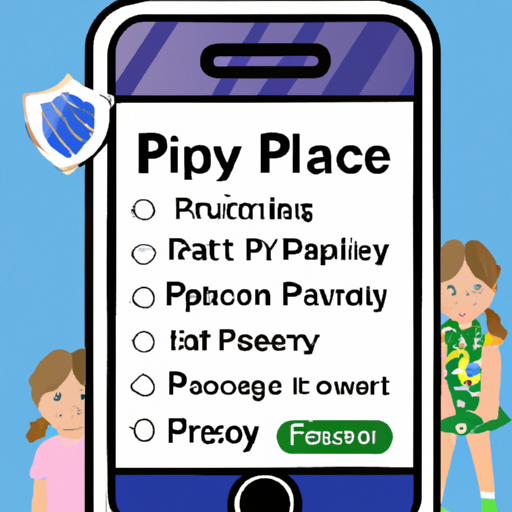In today’s digital age, mobile apps have become an integral part of our daily lives. From social media platforms to banking apps, the convenience and ease of accessing information and services on our smartphones have revolutionized the way we live and work. However, with this increased reliance on mobile apps comes the need to protect our privacy and personal information. In this article, we will explore the importance of having a privacy policy for mobile apps, the key components that should be included, and answer some frequently asked questions to ensure that both businesses and users are well-informed and protected in this rapidly evolving landscape of technology and data.

Privacy Policy for Mobile Apps
In today’s digital age, privacy has become a significant concern for users of mobile applications. With the increasing use of smartphones and tablets, it is essential for app developers to prioritize the protection of user data. A privacy policy for mobile apps serves as a crucial tool for establishing trust with users, complying with legal requirements, and safeguarding user information.
Why is a Privacy Policy Important for Mobile Apps?
Protecting User Data
A privacy policy outlines how user data is collected, used, and stored within a mobile app. By clearly communicating these practices, app developers can mitigate the risk of data breaches and unauthorized access to user information. This helps to protect both the users and the app developers from potential legal consequences and reputational damage.
Building Trust with Users
Through a comprehensive privacy policy, app developers can establish trust with their users. When users are aware of the steps taken to protect their privacy, they are more likely to feel confident in using the app and providing personal information. This trust is vital for maintaining a positive user experience and encouraging continued engagement with the app.
Compliance with App Store Requirements
Major app stores, such as the Apple App Store and Google Play Store, have specific guidelines and requirements for app developers. Including a privacy policy in the app is often a mandatory requirement for submission to these app stores. Failing to comply with these requirements could result in rejection or removal of the app from the store, limiting its reach and potential user base.
What is a Privacy Policy?
Definition and Purpose
A privacy policy is a legal document that outlines how an app collects, uses, and protects user data. It serves as a transparent and informative guide for users, explaining their rights and the app developer’s responsibilities regarding privacy.
Legal Requirements
Many jurisdictions, including the European Union under the General Data Protection Regulation (GDPR) and California with the California Consumer Privacy Act (CCPA), have specific legal requirements for privacy policies. These laws require app developers to clearly state their data collection practices and give users the option to provide informed consent.
Components of a Privacy Policy
A privacy policy typically includes sections that cover the following aspects:
-
Information collected: The types of data collected from users, including personal information, device information, location information, and any additional data collected.
-
Data usage: How the collected data is used to enhance user experience, improve app performance, support advertising and marketing efforts, and fulfill legal obligations.
-
User consent: The legal basis for data processing and the methods used to obtain user consent for collecting and using their data.
-
Data storage and protection: How user information is stored, the security measures in place to protect the data, and the response plan in the event of a data breach.
-
Third-party sharing: Whether user data is shared with third parties and the safeguards in place to ensure the protection of user information.
What Information is Collected?
Personal Information
Personal information refers to any data that can be used to identify an individual, such as name, email address, phone number, or social media accounts. Mobile apps may collect personal information for various purposes, such as user account creation, customer support, or marketing.
Device Information
Mobile apps often collect device information to improve their performance and provide a personalized experience. This may include the device’s unique identifier, operating system version, language settings, and other technical details.
Location Information
Some apps may collect location information to offer location-based services or display localized content. The use of this data should be clearly outlined in the privacy policy to inform users of how their location information is used and shared.
Other Information
Additional information collected by mobile apps might include usage data, such as app usage patterns, interactions, and preferences. This data helps app developers improve their products and tailor them to the needs of the users.
How is the Collected Information Used?
User Experience Customization
The collected information can be used to personalize the user’s experience within the app. By understanding user preferences and behavior, app developers can provide targeted content and recommendations, ultimately enhancing the user experience.
Analytics and Performance Improvement
Data collected from users can be valuable for analytics purposes. App developers can analyze user behavior, app usage patterns, and performance metrics to identify areas for improvement, fix bugs, and optimize the app’s performance.
Advertising and Marketing
App developers may use the collected data, including user demographics and preferences, to deliver targeted advertisements and marketing campaigns. However, user consent must be obtained for these purposes, and users should be given options to control the use of their data for advertising.
Legal and Security Purposes
In certain cases, user data may be used to fulfill legal obligations or to ensure the security and integrity of the app. For example, app developers may need to retain user data for a certain period as required by law or use it for fraud prevention and security measures.
Is User Consent Required?
Legal Basis for Data Processing
Depending on the jurisdiction, app developers must have a lawful basis for collecting and processing user data. This legal basis must be clearly communicated in the privacy policy and must comply with applicable laws and regulations.
Consent for Collection and Use of Data
In many cases, user consent is required before collecting and using their data. Consent must be obtained through affirmative action and given freely, with users having the option to withhold or withdraw their consent at any time.
Consent for Sharing Data with Third Parties
If user data is shared with third parties, separate consent should be obtained for such sharing. Users must be informed of the third parties involved and the purpose of the data sharing. Clear communication and transparency are essential to obtaining informed consent from users.
How is User Consent Obtained?
Affirmative Action
User consent should be obtained through affirmative action, such as clicking on an “I Agree” or similar button. Passive consent, such as pre-ticked checkboxes, is generally not considered valid. App developers should ensure that consent is actively and clearly given by the user.
Clear and Transparent Communication
App developers must clearly communicate to users what data will be collected, why it is collected, and how it will be used. The privacy policy should be easily accessible within the app, and any significant changes to the policy should be communicated to users in a transparent manner.
Obtaining Consent from Minors
If the app is targeted at or likely to attract minors, special care must be taken to obtain parental or guardian consent. App developers should provide clear instructions and mechanisms for parents/guardians to provide consent and manage their child’s data.
How is User Information Stored and Protected?
Data Storage and Retention
App developers should disclose how long user data will be stored and the purpose for which it will be retained. The privacy policy should outline the data retention periods and any procedures for deleting or anonymizing user data.
Security Measures
App developers have a responsibility to implement appropriate security measures to protect the user data collected. This may include encryption, access controls, regular security audits, and staff training on data protection best practices.
Data Breach Response Plan
In the event of a data breach, app developers should have a response plan in place. The privacy policy should outline the steps taken to detect, respond to, and mitigate the impact of a data breach, including notifying affected users and relevant authorities.
Is User Information Shared with Third Parties?
Identifying Third Parties
App developers should clearly identify any third parties with whom user data is shared. This may include analytics providers, advertising networks, or other business partners. Users should be informed of these third parties and their purposes for accessing the data.
Data Sharing Practices
The privacy policy should outline how user data is shared with third parties, including the legal basis for such sharing and any safeguards in place to protect user information. Data sharing practices must comply with applicable laws and regulations.
Safeguards and Contracts
App developers should implement appropriate safeguards, such as data processing agreements or contracts, to ensure that third parties adhere to the same privacy and security standards as required by the app developer. These agreements help protect user data even when it is shared externally.
How are Privacy Policy Updates Communicated?
Privacy policy updates should be communicated to users in a clear and transparent manner. App developers should provide notice of any significant changes to the privacy policy and obtain user consent if required by applicable laws. Appropriate mechanisms, such as push notifications or in-app pop-ups, should be used to inform users of changes and provide them an opportunity to review and accept the updated policy.
What are the Consequences of Non-Compliance?
The consequences of non-compliance with privacy laws and regulations can be severe. App developers may face legal penalties, fines, or civil lawsuits for failing to protect user data or violating applicable requirements. Additionally, non-compliance can lead to reputational damage and loss of user trust, which can negatively impact the success and growth of the mobile app.
FAQs
What should be included in a Privacy Policy for a mobile app?
A privacy policy for a mobile app should include information on the types of data collected, how the data is used and shared, the legal basis for processing the data, security measures in place, and contact information for inquiries or concerns about privacy. It should also be easily accessible within the app and written in clear and understandable language.
Is it necessary to update the Privacy Policy when adding new features?
Yes, app developers need to update the privacy policy when adding new features or functionalities that involve the collection or use of user data. Users must be informed of any changes that may affect their privacy rights and given the opportunity to review and accept the updated policy.
Can a mobile app collect personal information without user consent?
In most jurisdictions, mobile apps cannot collect personal information without obtaining user consent, unless there is a legitimate legal basis for such collection. User consent is a fundamental requirement to ensure transparency and control over the use of personal information.
What are the consequences of not having a Privacy Policy for a mobile app?
Not having a privacy policy for a mobile app can lead to legal consequences such as fines and penalties, rejection or removal of the app from app stores, and potential lawsuits from users or regulatory authorities. It can also result in a loss of user trust and a negative impact on the reputation and success of the app.
How can a mobile app ensure compliance with privacy laws across different jurisdictions?
To ensure compliance with privacy laws across different jurisdictions, app developers should conduct a thorough analysis of the applicable laws and regulations. They should tailor their privacy policy and data processing practices to comply with the strictest requirements and seek legal advice if needed. Regular monitoring of changes in privacy laws is also necessary to maintain compliance.



